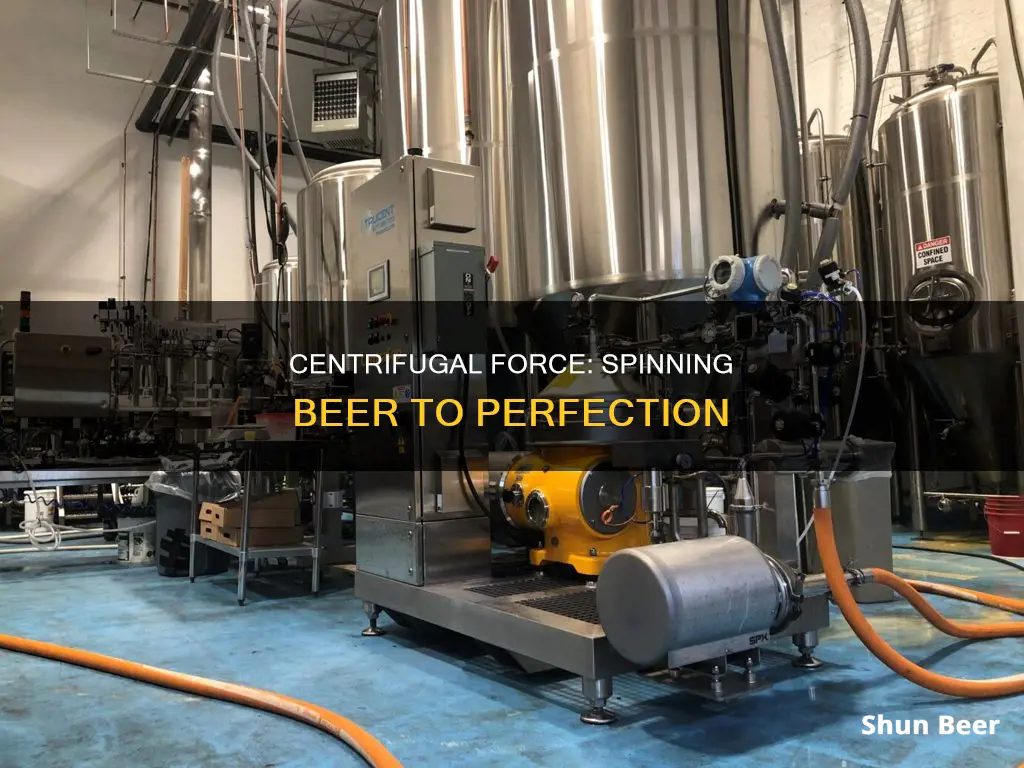
Centrifuges are an essential tool for brewers to separate liquids from solids, such as yeast, hops, and proteins, to achieve a clean beer. Centrifuges work by spinning liquids within a round chamber at high speeds, causing denser solids to be pushed out to the edges and ejected, while the clarified liquid remains in the centre. This process is much faster than traditional methods of solids removal, which can take days, and it also increases yield by reducing the amount of beer lost during the separation process. Additionally, centrifuges preserve the desired flavours of the beer better than traditional filtration methods, as they do not strip away hop and malt flavours.
| Characteristics | Values |
|---|---|
| Purpose | To separate solids from liquids in beer |
| Mechanism | Centrifugal force |
| Process | Continuous, single-step process |
| Speed | Thousands of rpm |
| Separation | Based on weight/density |
| Advantages | Faster, higher yield, better retention of aromatics and volatiles, greater consistency, indefinite operation, self-cleaning, space-saving |
| Disadvantages | Expensive |
What You'll Learn

Centrifuges separate solids from liquids
Centrifuges are an effective way to separate solids from liquids in the beer-making process. The basic idea is that particles, sediment, and solids gradually fall to the bottom of a settling tank, and the liquid phases of different densities separate due to the force of gravity. Centrifuges speed up this natural settling process by applying radial forces to the liquid, causing it to move in a circle. The centrifugal forces increase with the density and speed of the liquid, pushing the denser objects toward the outer border of the circle.
In a brewery centrifuge, the liquid (wort or beer) is laden with various types of suspended particulate, including yeast, trub, and hop residue, each with a different density. When the centrifuge spins the liquid within a round chamber at a high speed, the heavier components, such as trub and yeast, experience greater centrifugal forces and move closer to the chamber's outer wall. Meanwhile, the lightest components, including water and alcohol, stay closer to the centre axis of the rotation chamber.
The type of centrifuge commonly used in breweries is called a disc stack separator. When the denser solids are subjected to centrifugal forces, they are forced outwards against the rotating bowl wall, while the less dense liquid phases form concentric inner layers. The area where these two different liquid phases meet is called the interface position, which can be adjusted to ensure maximum separation efficiency. The heavier solids are then collected and discharged at the periphery of the bowl, while the clarified beer exits through the top.
Centrifuges offer several advantages over traditional filtration methods in beer-making. They are faster, more efficient, and result in less product loss. They also help preserve the desired hop and malt flavours, as the process does not strip away these flavours like filtration methods can. Additionally, centrifuges provide better retention of aromatics and volatiles, resulting in a higher-quality, more flavourful beer.
Krups Beertender: Compatible With Other Beers?
You may want to see also

Centrifugal forces remove particles by weight
The speed at which the liquid is spun also affects the centrifugal forces. The faster the liquid moves in a circle, the greater the centrifugal forces. In a beer centrifuge, the liquid is typically spun at thousands of rpm, providing increased settling area and clarification.
The type of centrifuge used in breweries is called a disc stack separator. When denser solids are subjected to centrifugal forces, they are forced outwards against the rotating bowl wall, while the less dense liquid phases form concentric inner layers. The area where these two different liquid phases meet is called the interface position, which can be adjusted to ensure maximum separation efficiency.
The centrifugal forces remove particles by weight, with gentle acceleration in the bowl and the internal disc stack allowing for physical separation. This process separates heavier particles, such as yeast, hop solids, and proteins, from the beer.
Beano and Beer: Does the Enzyme Work?
You may want to see also

Centrifuges increase settling area
Centrifuges are designed to increase the settling area, which is crucial for the clarification of beer. The basic principle behind a centrifuge is to accelerate the natural settling of particles in a liquid. In the context of brewing, a centrifuge separates solids from liquids, such as removing hop particles, yeast, and proteins from the beer.
The centrifuge achieves this separation by spinning the liquid at a high rate of speed, often several thousand rpm. Due to centrifugal forces, denser solids are forced outwards against the rotating bowl wall, while less dense liquids form layers closer to the centre. This separation is further enhanced by the difference in the circumference travelled by the liquids and solids, with the liquids closer to the centre covering a much smaller distance.
The increased settling area provided by centrifuges speeds up the clarification process. This results in a more efficient removal of unwanted yeast, hops, and protein solids, ensuring that the beer is clarified and polished effectively. The centrifugal forces generated by the machine can be several thousand times greater than the Earth's gravitational force, demonstrating the power behind this technology.
By utilising centrifuges, brewers can achieve greater consistency and quality in their beer. The increased settling area allows for faster clarification, reducing the time needed for maturation and final conditioning. This, in turn, leads to a higher yield, as brewers can produce more batches of beer in a year. Additionally, the gentle acceleration and internal disc stack of centrifuges help preserve the desired hop and malt flavours, resulting in a more flavourful final product.
Tums to the Rescue: Beer Sickness Solution?
You may want to see also

Centrifuges improve consistency and quality
Secondly, centrifuges improve consistency and quality by minimising product loss. Traditional methods of solids removal often result in a significant amount of beer being discarded along with the unwanted solids. Centrifuges, on the other hand, can separate liquids and solids in a single continuous process, maximising beer recovery.
Thirdly, centrifuges improve consistency and quality by preserving the desired flavours and aromas of the beer. Unlike filters, which can strip away desirable hop oils and volatile aromatics, centrifuges only remove larger particles, leaving the finer flavour compounds intact.
Finally, centrifuges can improve consistency and quality by reducing the amount of dissolved oxygen that comes into contact with the beer during the separation process. Oxygen is known to degrade beer over time, so minimising oxygen exposure helps to improve the shelf life and flavour stability of the beer.
The Magic of Beer Widgets: How Do They Work?
You may want to see also

Centrifuges are self-cleaning
The increased centrifugal acceleration means that the finest solid particles can be separated, and the reduction in costs for filter aids is substantial. Kieselguhr filtration is also reduced, and the taste of the beer is improved by separating unlike protein complexes and improving sensory stability.
The self-cleaning feature of centrifuges also means that the process is more environmentally friendly. The application of the whirlpool and centrifuge for clarification of the wort meets the needs of users for a continuous mode of operation and greater economy.
The self-cleaning process also allows for the removal of the finest solid particles, which is essential for the brewing process.
Exploring Beer Enhancement With Bazooka Tubes
You may want to see also
Frequently asked questions
A beer centrifuge is a machine that separates solids from liquids in the beer-making process.
Beer centrifuges use centrifugal force to separate denser solids from liquids. The beer is spun at high speeds, causing denser solids to be forced outwards against the rotating bowl wall, while less dense liquids stay closer to the centre.
Beer centrifuges can increase yield, improve quality, and reduce the time needed for the beer-making process. They are also self-cleaning, require little space, and can help preserve the aroma and flavour of the beer.
Beer centrifuges separate particles by weight, while filters separate particles by size. Centrifuges are also less prone to clogging and can help extend the shelf life of the beer.
Beer centrifuges can be expensive, and they may not be suitable for all types of beer or brewing processes.







